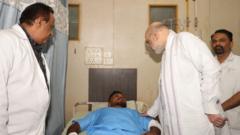Jehuda Lindenblatt, a Holocaust survivor, faces the reality of terminal cancer, prompting a poignant reflection on his life and legacy. While visiting friends in London, the author learns of Lindenblatt's condition and recalls the warmth and lessons handed down through generations. As a father who coached and supported youth during basketball games, Lindenblatt is emblematic of countless survivors who integrated their history into the fabric of everyday life.
Growing up in a neighborhood steeped in Holocaust narratives, the author emphasizes the importance of remembrance while grappling with the immense weight of a painful past. Education surrounding the Holocaust was intense, forming a core component of their identity and worldview. In reminiscing about high school curricula dominated by tales of survival and suffering, the author humorously critiques their own education, revealing a blend of deep empathy and sarcastic frustration.
Despite the shadows of such an extensive education, stories like those of Lindenblatt resonate as reminders of resilience, inspiring current and future generations to reflect on history. As Lindenblatt's struggle continues, the urgency to document and share these narratives intensifies, underscoring the cultural responsibility to preserve the memories of those who survived one of history's darkest times.
In grappling with loss and legacy, the author invites readers to confront their own understandings of history, reminding us that amidst sorrow, there exists a profound connection to human strength and community. The tales of survivors are not merely accounts of the past but lifelines that inform our present and shape our futures.
Growing up in a neighborhood steeped in Holocaust narratives, the author emphasizes the importance of remembrance while grappling with the immense weight of a painful past. Education surrounding the Holocaust was intense, forming a core component of their identity and worldview. In reminiscing about high school curricula dominated by tales of survival and suffering, the author humorously critiques their own education, revealing a blend of deep empathy and sarcastic frustration.
Despite the shadows of such an extensive education, stories like those of Lindenblatt resonate as reminders of resilience, inspiring current and future generations to reflect on history. As Lindenblatt's struggle continues, the urgency to document and share these narratives intensifies, underscoring the cultural responsibility to preserve the memories of those who survived one of history's darkest times.
In grappling with loss and legacy, the author invites readers to confront their own understandings of history, reminding us that amidst sorrow, there exists a profound connection to human strength and community. The tales of survivors are not merely accounts of the past but lifelines that inform our present and shape our futures.




















